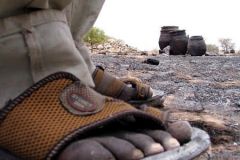Clash over Darfur highlights struggle of UN rights council
Oct 4, 2006 (GENEVA) — The United Nations’ top human rights body was presented with competing resolutions on Darfur Wednesday, one from the European Union critical of Sudan’s government and another from Algeria that went easy on Khartoum.
 The clash between European and Muslim countries over how to respond to atrocities in Darfur underscores sharp division within the U.N. Human Rights Council, and raises questions about whether it can be more effective than a discredited body it replaced.
The clash between European and Muslim countries over how to respond to atrocities in Darfur underscores sharp division within the U.N. Human Rights Council, and raises questions about whether it can be more effective than a discredited body it replaced.
Both proposed Darfur resolutions call on all warring parties to stop fighting and allow unfettered access to humanitarian workers. Neither text mentions the possibility of U.N. peacekeepers replacing African Union troops in Darfur, which has been approved by the Security Council but so far blocked by Sudan’s government.
But the resolution proposed by Finland, which currently holds the 25-nation EU’s rotating presidency, “emphasizes the primary obligation of the government of Sudan to protect all individuals against violations, including sexual and other forms of gender-based violence and the use of child soldiers.”
Algeria’s proposal, by contrast, stresses the obligation of “all parties” to put an immediate end to human rights violations in Darfur. It singles out Sudan’s government only in welcoming Khartoum’s cooperation with the council’s special envoy on human rights in Darfur and in asking the international community to provide it with financial and technical assistance.
The Algerian resolution was filed first and comes before the European one on the agenda. It is expected to pass in the council, which would mean the EU’s draft would not even be discussed. Voting on a wide range of resolutions is scheduled to begin Thursday.
Criticism by the council brings no penalties beyond international attention.
At least 200,000 people have died and more than 2 million people have been displaced in the Darfur conflict, which began in early 2003 when ethnic African tribes revolted against the ethnic-Arab dominated government. U.N. officials have accused the government of bombing villages and supporting Arab militiamen blamed for some of the worst atrocities. An array of rebel groups — only one of which signed a May peace agreement with the government — have also come in for criticism, accused of attacking aid workers and doing too little to calm the situation. Aid workers and rights groups say the violence in Darfur has increased in recent months as rebels jockey for position and the government targets groups that did not sign the peace treaty.
In the four months since the council replaced the Human Rights Commission, it has directly condemned only one country, Israel, censuring it for military offensives in the Gaza Strip and Lebanon.
The defunct commission’s members included countries with poor human rights records — such as Sudan, Libya, Zimbabwe and Cuba — who tried to shield each other from censure. It spent a week each year criticizing Israel’s human rights record, while countries like China and Russia scrutiny. The commission never publicly criticized Sudan’s government for its conduct in Darfur.
The new council was seen as a fresh start on human rights after years of controversy over the commission, which had been held up for ridicule by the United States and others. But some see old patterns re-emerging.
“If the council can’t get past Israel and address a wider range of issues, then it is not going to be any improvement on the discredited Human Rights Commission,” said Reed Brody of Human Rights Watch. “Up until now it has been very one-sided. If it continues in this direction, it is not going to have very much credibility.”
U.N. Secretary General Kofi Annan opened the council’s current session last month with a plea that members address the conflict in Sudan’s western region. The United States also has said it wants the council to take action on Darfur, but is only an observer at the Geneva-based body.
Arab and Muslim members have been seeking ways to avoid a resolution that would in any way condemn Khartoum, even as they ask the council to renew its criticism of Israel. African nations have opposed naming and shaming countries for human rights violations — except in the case of Israel.
African or predominantly Muslim countries who hold 21 of the council’s 47 seats frequently get support from China, Cuba, Russia and some Latin American states.
U.N. and European officials have said the Organization of the Islamic Conference — currently led by Pakistan — offered not to propose a resolution accusing Europe of racism against Arabs if Europeans abstained from pressing on Darfur. Pakistani Ambassador Masood Khan denied that.
Johanna Suurpaa, who heads the Finnish Foreign Ministry’s human rights division, said the EU had tried to accommodate other countries’ concerns with its Sudan proposal.
“It does not have the word ‘condemn’ anywhere,” Suurpaa told The AP. She said the key issue was holding Sudan’s government responsible for protecting civilians against violence and rape.
(AP/ST)
